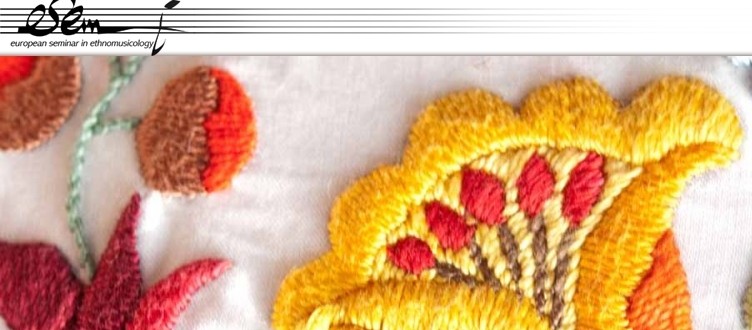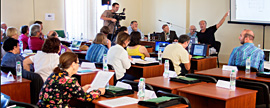On September 5-9, the 33rd European Seminar in Ethnomusicology took place in Tbilisi, Georgia. The conference was hosted by the International Research Center for Traditional Polyphony at Tbilisi State Conservatoire, which is very experienced in holding International Symposia on Traditional Polyphony since 2002.
The conference title was “Ethnomusicologie in the 21st Century” and as a result, the papers and discussions reflected the existing status and emerging trends in our discipline.
A few topics were prominently represented at the conference.
One of them was the still existing gap between the Western and Eastern ethnomusicologies (particularly the scholars from the former USSR). The infamous Iron Curtain had been gradually replaced by financial and linguistic curtains. The need for the financial assistance for conference participation is still needed, and the lack of translated prominent works from both worlds is still strongly felt.
Another prominent topic was the commercialization of many spheres of traditional music, problems of authorship and copyright, with still plenty of logistical procedures not in place. Various competitions between traditional performer and the role of professional jury was another hot topic, with scholars indicating both the positive and negative connotations of the prestigious awards and monetary rewards.
Probably the most active was the discussion on the attitudes towards contemporary, popular-music-fuelled electronic-fusion-hybrid styles of traditional-pop music. This process was actively negotiated in both Westerns and Eastern countries during the last decades. LGBT and gender studies occupied a fair share of the discussion time as well.
The night before the conference opening the conference guests were able to see the inspiring performance of Georgian ensembles of traditional music together with the choir from Premana in the Italian Alps.
After the official opening on September 5 by the Rector of Tbilisi State Conservatory Rezo Kiknadze and the president of ESEM Britta Sweers, the first (and the following three session) were dedicated to the topic “ETHNOMYSICOLOGIES IN 21ST CENTURY: NEW RESEARCH AND METHODS”.
Under the umbrella of this topic the following papers were presented: Joseph Jordania (Australia/Georgia) “Shaping Ethnomusicology: from 19st to 21st Centuries”; RytisAmbrazevičius (Lithuania)“Cross-Cultural Study of Music Perception and Its Implications from the Ethnomusicological Perspective”; Gerda Lechleitner (Austria) “Sound Recordings Preserved as a Vision for Ethnomusicology”; Sławomira Żerańska-Kominek (Poland) “Vanishing Boundaries. Anthropologisation of (Ethno)musicology and Its Discourses”;Caroline Bithell (UK) “Local Musicking, Global Activism and a Borderless Ethnomusicology for the 21st Century”; Britta Sweers (Switzerland) “A Heterogeneous Discipline at the Centre of Europe: Ethnomusicology in Switzerland”; Žanna Pärtlas (Estonia) “Music Analysis in 21st Century Ethnomusicology: Merging the Insights of the “Western” and “Eastern European” Ethnomusicological Traditions”; Marina Kaganova (USA) “Between the Voice and the World: Community as Mediated Through Vocal Musical Practice”; Helen Rees (USA) “Twentieth-Century Legacies in Twenty–First Century Ethnomusicology: a Tale of Connections Made, Broken, and Made Again in Los Angeles and Bangkok”; Laudan Nooshin (UK) “ ‘Angel of Salvation’? Gender Dimensions of Music and the Internet in Iran”; Hettie Malcomson (UK) “Academic Knowledge, Hip Hop and Violence in Mexico”.
The first working day of sessions was concluded by a concert of Georgian and Italian traditional songs at the historical Grand Hall of the Conservatoire, followed by the Welcome Reception.
The next day sessions continued the topic of the first day. The following papers were heard and discussed: Marija Dumnić (Serbia) “Urban Folk Music in the Balkans’ Soundscape”; David Verbuč (Czech Republic) “Living and Touring with American DIY Youth: Participation and Ethnography in Western Popular Music Research”; Thomas R. Hilder (Norway) “Singing the New Europe: LGBT Choirs and the Geopolitics of Queer European Citizenship”; Alena Libánská(Czech Republic) “The Ethnomusicologist as a Subject of Her Own Research: the Use of a Reflexive Approach in the Research of Balkan Music in Prague”.
The panel “Problems of Method in a Fieldwork among the Immigrant Christian Communities in Rome” comprised of two presentations: Serena Facci (Italy) “Comparative Approaches”, and Alessandro Cosentino (Italy) “Key Figures and Innovators in New Musical Contexts”.
A special panel presentation “New Approaches in Georgian Ethnomusicology” was dedicated to the hosts of the conference, young generation of Georgian ethnomusicologists, spearheaded by Rusudan Tsurtsumia (Georgia) “Georgian Traditional Music Today: Revival as Preservation?” Young scholars, PhD candidates: Teona Lomsadze (Georgia) “Georgian Ethno-Fusion Groups: Another Alternative for the Preservation of Traditional Music”; Nino Razmadze (Georgia) – “Georgian Panpipe (Larchemi/Soinari): Tradition and Innovation”; Baia Zhuzhunadze (Georgia) “The Formal Teaching/Learning of Georgian Traditional Music (at the turn of the 20st-21st Centuries)”.
The panel of Georgian scholars was followed by poster presentations: Nona Lomidze (Austria/Georgia) “Prerequisites for Georgian Singing to be Put on the Market”; Sophiko Kotrikadze (Georgia) “The Challenges of the 21st Century and Georgian Ethnomusical Practice”; Nino Naneishvili (Georgia) “On the Types of Christian Liturgical Music in Today’s Georgia”.
The second day of the conference was concluded by two parallel workshops, led by Georgian ethnomusicologists (Tornike Skhiereli and Levan Veshapidze), familiarizing the conference guests with the performance of West Georgian round dance and Gurian yodeling tradition.
Thursday, September 7 was dedicated to another big topic: WELCOME TO THE SECOND WORLD: ETHNOMUSICOLOGY IN FORMER COMMUNIST COUNTRIES. This topic united the following presentations: Razia Sultanova (UK) “Cultural Study of Music in Soviet and Post-Soviet Times”; Susanne Ziegler (Germany) “Ethnomusicology in Berlin around 1989 – Meeting Point of East and West”; Tamaz Gabisonia (Georgia) “Georgian Authored Folk Song of the Soviet Epoch, as a Victim of “Authenticism”; Ulrich Morgenstern (Austria) “Public Discourse on Folklore in Contemporary Russia between Artistic Practice and Ideology”; Anda Beitāne (Latvia) “Let’s Go to the Market? The Folklore Festival as a Marketplace”; Dan Lundberg (Sweden) “Market, Consumption and Folk Music”; Thomas Solomon (Norway) “Musical Mediations of Laz Identity: Market Economy Ethnicity on the Turkish Eastern Black Sea Coast’;
A panel “The Sonic Dimension of Gender. Interdisciplinary Perspectives on Voice in the Post-Yugoslav Area” was represented by the paper of Marko Kölbl, Tatjana Marković(Austria), and Adriana Sabo (Serbia).
Another panel reviewed the Greco-Roman Past: Polyphony in the Classical World, comprising of two papers Manuel Lafarga (Spain) “Polyphonic Traditions in the Greco-Roman World” and Penelope Sanz (Spain) “Polyphonic Instruments in the Greco-Roman World”.
Poster Presentations followed: Sébastien Leblanc (Canada) “The Musical Integration of Romanian and Moldovan Migrants to Montreal’s Multicultural Society”.
Friday, September 8, opened a session “MARKET ECONOMY POLITICS: THE MANY FACES OF TRADITIONAL MUSIC AND DANCE,” representing papers of Polish colleagues: Arleta Nawrocka-Wysocka “Cultural and Religious Borderlands in Polish Ethnomusicology before and after 1989 – with an Emphasis on Areas Inhabited by Lutherans”, Ewa Dahlig-Turek “The (Polish) Ethnomusicologist on the Free Market”, Teresa Nowak “Market Economy Politics: the Many Faces of Traditional Music and Dance. Recent Recordings of Traditional Music in Poland: What do We Wish to Preserve through Them?” Tomasz Nowak “An Ethnomusicologist between the Stage and the Jury Table: the Polish Case”.
Friday afternoon and evening were dedicated to the cultural program, when the guests visited the medieval architectural complex Ananuri, heard Georgian liturgical chants performed by Georgian colleagues in the church, visited the 11th century cathedral “Svetitskhoveli” in Mtskheta – the ancient capital of Georgia, and then, on the territory of Armazi, the most prominent pre-Christian site of Georgia, the guests had a banquet, accompanied with traditional and urban music, and dances involving the conference participants.
On the very last day, Saturday, September 9, the remaining papers on the topic of market economy, were delivered: Linda Cimardi (Italy) “Lifestyle, Work and Leisure: the Niche Economy of World Music Practice in Croatia”; and Mats Nilsson (Sweden) “Moving Music: Dance as a Mode of Using Music.” The last working session was dedicated to poster presentations: Luke Fowlie (Canada) “From Cameroon to Montreal: Musical Choices and Social Representation among Grassfields Diasporic Communities”; Galina B. Sychenko (Russia) “A New Interdisciplinary Research Project of Comparative Studies of Turkic and Slavic Song Traditions in Siberia: on Song Typology”, and Austė Nakienė (Lithuania) “Forest Brothers”: Historical Narrative and Singing Tradition”.
In a bit of an unexpected twist of the history of ESEM, created in 1981 by Prof. John Blacking (1928-90), in addition to the usual matters of the General Assembly (like elections), the ESEM society was officially established, with all the formal details (such as necessary financial attributes), making this memorable meeting even more memorable.
Tbilisi ESEM-2017 seminar was the easternmost in the history of the society, and the first one to take place on the territory of the former USSR. The fact, that next seminar will take place in another former USSR republic, Latvia – already a member of EU, indicates that the voices from new independent states are getting louder in the common chorus of European ethnomusicology.





